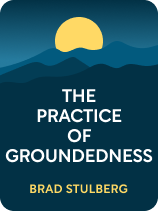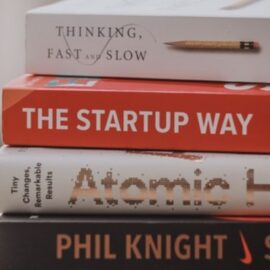

This article is an excerpt from the Shortform book guide to "The Practice of Groundedness" by Brad Stulberg. Shortform has the world's best summaries and analyses of books you should be reading.
Like this article? Sign up for a free trial here.
What is heroic individualism, and where does it come from? Why are so many people stuck in an extreme individualistic mindset?
Heroic individualism is a mindset of thinking that you need to outperform and achieve more than other people, and it comes from overvaluing productivity. Examining the concept of heroic individualism can help you determine if you have a healthy mindset toward work and happiness.
Keep reading to learn more about the origins of heroic individualism and what it looks like in practice.
The Problem: We Value Productivity Too Much
Where does heroic individualism come from? In today’s world, we obsess over ways to increase productivity and maximize efficiency, often at the expense of our well-being. Society floods us with messages pushing us to improve how we live and work, and technology has furthered this culture of busyness—smartphone apps, for instance, allow us to track everything from our productivity to the calories we burn during a workout. Because of this, we often find ourselves on a never-ending quest for peak performance and greater happiness.
(Shortform note: In How to Do Nothing, Jenny Odell argues that our obsession with productivity arose with the emergence of the attention economy—when we, as a society, started assigning monetary value to time and attention. She explains that in the 1980s, corporate deregulation, wage stagnation, and a loss of social safety nets pressured people into working more, causing them to think about their time in terms of money. Then, the internet and social media monetized attention with pay-per-click ads, sponsorships, paid promotions, and so on—all fighting for our attention and profiting from it.)
In this article, we’ll explore the consequences of this approach to success and share signs that you may be trapped in this cycle.
The Perils of Heroic Individualism
When we place too much value on improvement, speed, and productivity, we suffer from heroic individualism. If you’re a heroic individual, you feel like you must constantly outperform others, achieve more, feel happier, and be capable of doing everything. This approach to life and success can be damaging in two ways.
First, heroic individualism is unsustainable because it can lead to mental and physical health problems. When you’re constantly striving for more, you’ll feel perpetually dissatisfied with your life and accomplishments. This constant negativity can, over time, result in disorders such as OCD, depression, and anxiety, which can then stop you from pursuing your success and happiness.
(Shortform note: In When the Body Says No, Gabor Maté argues that our minds and bodies are closely linked, which is why the prolonged stress and negativity that often accompany heroic individualism can lead to physical and mental illnesses. He explains that stress causes physiological responses that help us escape immediate dangers like predatory animals, but our bodies can’t handle that response for long periods. This leads to an array of health problems ranging from nervous system diseases to cancer.)
Second, heroic individualism can undermine your productivity and career success. When we focus on staying busy at all costs, we tend to do anything that seems productive without pausing to consider if it’s worth our time. As a result, we neglect the things that matter most, and instead of making steadfast progress toward our goals, we end up burned out and overwhelmed.
| Exploring the Term “Heroic Individualism” Breaking down the term “heroic individualism” can give us a better understanding of why many people have this mindset and why it’s so common. In The Second Mountain, David Brooks defines individualism as a worldview that emphasizes the value of the individual, divorced from community. Brooks argues that individualism leads to deep dissatisfaction because we focus too much on ourselves, causing us to either fixate on worldly success or pursue thrilling experiences—neither of which provides lasting satisfaction. In Courage Is Calling, Ryan Holiday defines heroism as courage in service of others—service that often requires great self-sacrifice. When “heroism” is coupled with “individualism,” the term suggests, perhaps, an approach to life where we’re not making sacrifices for others, but instead for worldly pursuits—sacrifices that take a toll on our well-being and productivity, and pursuits that don’t bring us lasting satisfaction. |
Signs You’re Suffering From Heroic Individualism
People experience heroic individualism in different ways, but some signs you’re suffering from heroic individualism could be:
- You feel anxious and rushed all the time.
- You have trouble relaxing but wish that you could.
- You struggle to focus and get distracted easily.
- You feel overwhelmed by the amount of advice and tips for improving yourself.
- You feel lonely or empty.
- You have achieved a lot of external success but still feel like you’re not enough.
| Is External Validation at the Root of Heroic Individualism? These signs of heroic individualism may all stem from an underlying need for external validation—the approval of others—which can lead to feelings of anxiety, stress, loneliness, and unhappiness. In Codependent No More, Melody Beattie explains this phenomenon, writing that when you turn to other peoples’ opinions to validate your worth, your confidence and happiness end up dependent on the judgments of those other people—and since you can’t control another person’s thoughts or feelings, any confidence built in that way is fragile. In 101 Essays That Will Change the Way You Think, Brianna Wiest notes that this is a common problem that many people struggle with because we often operate on patterns set during childhood. As children, we received comfort and happiness by conforming to others’ expectations—getting praised for good grades, for example. Because of this, we learn to base our opinions of ourselves on how others view us. Weist writes that we can begin to change those patterns of thinking by recognizing when we’re giving control of our thoughts or feelings to another person, and then purposefully choosing to think differently. |

———End of Preview———
Like what you just read? Read the rest of the world's best book summary and analysis of Brad Stulberg's "The Practice of Groundedness" at Shortform.
Here's what you'll find in our full The Practice of Groundedness summary:
- How "hustle" culture leads to burnout, illness, and unhappiness
- The six principles of groundedness to keep you balanced and stable
- Why you should create deep, quality relationships rather than many shallow ones






